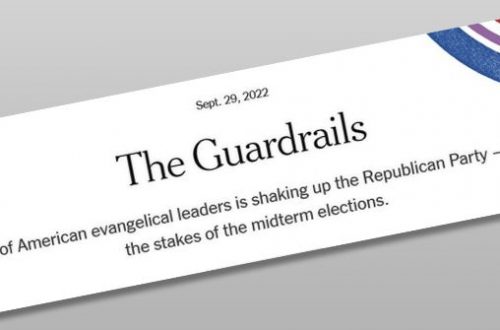 David Instone-Brewer contributes an interesting piece in the opinion section of today’s Wall Street Journal. The article uses Rudy Guiliani’s multiple marriages as a springboard for discussing American evangelicalism’s attitudes about divorce. He writes,
David Instone-Brewer contributes an interesting piece in the opinion section of today’s Wall Street Journal. The article uses Rudy Guiliani’s multiple marriages as a springboard for discussing American evangelicalism’s attitudes about divorce. He writes,
Why are evangelicals so willing to accept divorce among their political leaders? It seems, increasingly, that political leaders look like evangelical church members. The divorce rate among evangelicals is actually as high as that of the general population.
The evangelical attempt to follow a literal interpretation of the Bible has always been difficult in the face of the realities of modern life. When Jesus was asked in the Gospels if he allowed “divorce for any cause,” he replied that anyone “who divorces his wife except for sexual immorality and marries another woman commits adultery” (Matthew 19:3). This admonition has long been interpreted to mean that divorce, for Bible-based Christians, is allowed only in cases of adultery. Even then, the spouse who has been faithful is treated the same as the adulterer: Neither can remarry as long as the other is alive.
In modern life, of course, the reasons for divorce go well beyond adultery, and fairly rapid remarriage is common. Evangelicals are part of this modern trend: Many have privately abandoned the Bible’s teaching on divorce. American law has pushed them along. For many years, divorce was a tort–legally possible only if one party to the marriage contract had violated it. Ronald Reagan, as governor of California, signed a no-fault divorce bill in 1970, and within 15 years every state in the union had a similar law. The cultural conversation shifted away from marriage’s mutual obligations–codified in law–and toward personal fulfillment.
The recent emphasis on the rights of individuals has even been encouraged by the current crop of evangelical preachers. Joel Osteen, the senior pastor of Lakewood Church in Houston, and Joyce Meyer, a Christian television and radio personality, have built their ministries on promoting individual development. It seems that this development can often be found in marriage, but also, for some, in divorce.
I’m not ready to endorse Instone-Brewer’s views on what constitutes biblical grounds for divorce, but I do think that he has correctly identified one of the most pernicious assaults on the sanctity of marriage that has ever occurred: the emergence of “no-fault” divorce laws. I regard “no-fault” divorce laws to be every bit as destructive to the sanctity of marriage as recent efforts to legalize homosexual “marriage.” As a matter of fact, I think the dumbing down of marriage expressed in “no-fault” divorce laws 30 years ago established the trajectory that has brought us homosexual “marriage” today. Both “no-fault” divorce laws and homosexual “marriage” advocates treat marriage like a trip to Burger King: “Have it your way.”
When evangelicals embrace the culture’s cavalier attitude toward marriage, they give up a giant piece of their prophetic witness to the culture. A husband’s sacrificial love for his wife is supposed to be a conspicuous, counter-cultural re-enactment of Christ’s love for His bride (Ephesians 5:25-33). Thus, Christian marriage becomes a crucial witness to the truth of the gospel.
Evangelical capitulation to the “no-fault” divorce culture bodes ill for the sanctity of marriage in American life. In my view, the greatest threat to the sanctity of marriage today is not so much that unbelievers would corrupt it, but that Christians would refuse to preserve and defend it in their own homes.




7 Comments
Josh R
Amen!
I think there is a significant disparity between people who call themselves evangelical and people who have a biblical world view.
Wade
Let’s be careful not to lay blame on legislated or unlegislated morality. The problem is much deeper than Reagan’s no-fault divorce law; this is a matter of the heart. How long has the church in America been guilty of going through the motions and not abiding in the Vine? I pray that God will overwhelm our country with the Holy Spirit and draw us back to a love for Him and His Word.
God help us all!
WadeC
jb
Divorce rates: Lower than you think
http://www.divorcereform.org/nyt05.html
Rodney Bradford
Could it be that much of the difficulty we are seeing in the divorce problem within the church is the loss of true community of the church. Individuals are cut off from one another or just refus teo be a part of the community. Often, when we as believers see our fellow brothers and sisters in Christ struggling in their marriages, surely is our call to step up and assist these couples–just as the early church would sell a piece of property to meet physical needs. I just do not see a commitment in the church to step up and help couples with these relational needs.
Also, as a pastor, I see a fear among ministers to truly teach forcefully and truthfully about marriage in the church because, frankly, there are so many people in the church who are divorced. I do not believe the divorce is the unpardonable sin, however, it is a sin that is so visible to the world in which we witness. If the world will know that we are disciples by the love we have for one another, what is it saying to the lost world win many of our members are regularly getting divorced?
jerry bishop
I always enjoy a good debate about the Bible’s view on divorce, but…
Others have made the case previously (and I think correctly) that the battle against homosexual marriage was lost years ago when the church began to accept that marriage was more like a contract which could be desolved than a union which couldn’t.
Paul
Jerry,
I totally agree. I’ll take it a step further though and say that No one, and I mean NO ONE has any right to talk about “the sanctity of marriage” as it pertains to gay marriage unless they support laying the no fault divorce to rest AND adopting anti-adultery laws in all 50 states.
Until then, if states can’t take heterosexual marriage seriously, they have absolutely no business condemning homosexual marriages.
jerry bishop
This is sort of after the fact sorry.
JB, thanks for the links to those stats. I have never believed the divorce numbers. I think they have been put out as a self fulfilling prophecy for a long time. The 50% numbers have never matched with any reality I have experienced (in any part of the country including CA). In reguards to “Christian divorce” I think the numbers are off and pushed for shock value by well known personalities. Reasons: Often they do not take into account 1) when the person became a Believer, 2) who is a gunine Believer and 3) Unbeliever are much more likely to bounce in and out of relationships without experiencing an actual divorce, which would inflate the numbers for those willing to marry.
Rodney B. Your ideas are interesting but there is good proof that the rate increases are directly related to the feminist movement. Women were impowered from the movement and were told that they should do what makes them happy. It did not work. It is not well known but the statistics are quite firm that 4 out of 5 divorces in America and Britan are sought by the woman. Typically, they seek divorce for some type of emotional abuse, etc. They then make a token gesutre of reconciliation, then leave never to go back and are finally much less happy than when they were married.
Paul, I don’t think “anti adultery” laws will ever come back, so there must be some way to talk about it without being inconsistent.